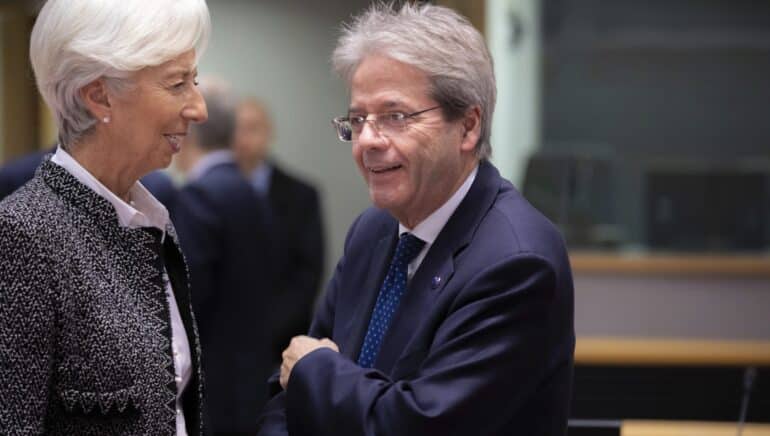
As the year 2020 comes to a close, the European Central Bank (ECB) and the European Parliament have put their respective programmes for the fight against the crisis on track for next year. The MEPs recently approved the approximately EUR 1.1tn Community budget for the next seven years, which includes EUR 750bn in Corona aid. To support the economy in the crisis, the ECB decided last week, among other things, to increase its PEPP pandemic bond purchase programme by EUR 500bn to EUR 1.85tn and to extend the purchases by nine months until the end of March 2022.
The ECB launched its emergency programme shortly after the pandemic’s escalation in March, with a volume of EUR 750bn, to buy government and corporate bonds. According to the ECB, the PEPP (Pandemic Emergency Purchase Programme) bond-buying programme is intended to help all sectors of the economy benefit from better financing conditions and thus mitigate the Corona shock.
Bond-buying programme to help finance crisis programmes
In concrete terms, the bond purchases will lower interest rates on the bond market, allowing cheaper refinancing for states and companies during the crisis. For example, states can finance their multi-billion euro rescue programmes more easily if the ECB itself acts as a buyer of their government bonds.
While previous ECB bond-buying programmes were tied to a capital key based on the individual euro countries’ population size and economic strength, the central bank is allowed to deviate from this key in its Corona emergency programme. It is thus more flexible and can buy more bonds from the states particularly affected by the crisis.
As a matter of fact, when the crisis broke out, the prices of European government bonds fell and their yields shot up briefly. However, as the PEPP bond purchases started, bond prices rose again and yields returned to previous levels. After an initial increase in June, the ECB has now once again massively expanded its pandemic bond-buying programme.
With the bond purchases, the ECB is also fighting the current negative inflation and trying to raise the inflation rate back to an economically desirable level. Most recently, the inflation rate in the eurozone was –0.3 per cent, far from the ECB’s target of around 2 per cent.
Extension of liquidity injections for banks
In addition, private banks are to enjoy more favourable conditions for a longer period in the large ECB liquidity injections called “TLTRO III”. With these cash injections, the institutions can even get a premium when they borrow the money. In addition, three more of these credit operations are to be launched between June and December 2021.
At the same time, the ECB Governing Council decided on a new series of emergency loans for banks, so-called “Pandemic Emergency Longer-Term Refinancing Operations” (PELTRO), which are to be granted in four tranches next year. In addition, purchases under the older APP bond programme are to continue at a monthly rate of EUR 20bn.
As expected, the central bank left its key interest rate at the record low of 0.0 per cent, where it has been since March 2016. The deposit rate also remains at minus 0.5 per cent. This means that banks currently have to pay penalty interest when they park surplus funds at the central bank.
The decision on the EU budget was awaited particularly eagerly this year. Hungary and Poland originally wanted to use a veto to prevent the disbursement of EU money being conditional on compliance with rule of law principles going forward. To that end, they initially blocked the EUR 1.1tn EU budget package. Without a solution, the EU would have had to enter 2021 with an emergency budget and would not have been able to launch the Corona aid package.
A compromise clears the path for EU budget after Hungarian and Polish veto
However, the heads of state and government finally agreed on a compromise at their summit meeting. The compromise provides that the new procedure for punishing violations of the rule of law will be supplemented by an additional declaration. Among other things, it specifies which options Hungary and Poland have to defend themselves against the regulation’s application. One of these is a review of the regulation for the procedure by the European Court of Justice.
Thus, the EUR 750bn Corona stimulus package envisaged in the budget is on track and should now support a post-crisis upswing. In the view of the EU Commission, the rapid deployment of Corona vaccines could accelerate the economic recovery in the process. “We could see a return to pre-crisis GDP levels sooner than expected,” the EU EVP for Economy, Paolo Gentiloni, said recently. The first positive signs are expected in Q1 of 2021. Before that, however, a difficult winter lies ahead, Gentiloni said.
Legal note:
Prognoses are no reliable indicator for future performance.


